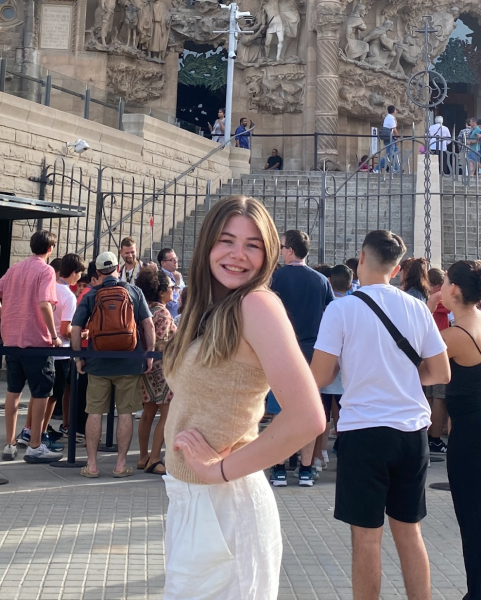Propaganda has been an unavoidable tool used to express political ideas and sway voters throughout history. Although the purpose of propaganda remains the same, the technology used to spread propaganda has become much more advanced.
Propaganda did not begin as an effort to support particular politicians in an election but as a way for middle-class citizens in Greece to spread political efforts using radios, newspapers or movies to shape the ideals of the people. The use of propaganda diffused into Europe and became a vital part of war efforts.
Eventually, when the American Revolution took place, propaganda came to the forefront of American politics. One of the most memorable pieces of propaganda leading to the revolution was the painting, “The Bloody Massacre in King-Street” by Paul Revere. Revere’s art is viewed as an important historical piece but had the intent of swaying colonists toward supporting independence from Britain.
The same propaganda continued throughout American history, whether it be liberty bonds, Rosie the Riveter, Uncle Sam or other symbolic American figures.
Past Iowa Senator, Maggie Tinsman has viewed a lot of propaganda throughout her time in politics. As she continues to lobby and advocate, Tinsman stresses the importance of making sure voters know the truth. “I think false information is always negative, people make up things so you do not get reelected, and sometimes that happened to me when I was being reelected. I would let people know through the newspaper and talk to the person who spread the false information, so people know what I think and what the truth is, and not false information,” said Tinsman.
Social media can make the spread of false information occur quicker. Even as the definition of propaganda remains throughout history, the format by which propaganda is spread has changed. Senior Pratima Khatri has become very involved in political and social media advocacy through her student-led organization “Act in Impact,” as well as leading PV’s Students for Political Action club.
Khatri believes social media and technological advancements contribute to change in propaganda. “I feel like propaganda has become more subliminal and targeted now because of the advancements with social media. Now more than ever, people know specifically what engages people, and how to get them to believe what you want them to believe,” Khatri said.
In contrast, junior Himanshu Jangid believes propaganda has not changed in definition or purpose, but rather in the way propaganda it is brought to audiences. “Propaganda has not changed either in its goal or creators. The only real “change” in my eyes is how it can be circulated. Social media, podcasts, music, video platforms and other things alike are now available to use to share propaganda in either visual or spoken forms,” said Jangid.
Jangid explained how propaganda has also continued to increase polarization. “It is also precisely for this reason that we have become more divided as well. There is an inherently negative association with propaganda because it relies on deceit, and as such I see no benefits. All of them push a certain objective in a frankly negative way,” said Jangid.
As elections approach, propaganda may help campaigners, but it can also spread misinformation. A 2018 study by MIT noted false information reaches users faster than true information. Many times this is a result of companies wanting to maintain audience engagement. To do so, social media companies use algorithms which decide what types of videos and what content keeps users scrolling the longest. If a video including misinformation results in higher engagement, the algorithm will continue to popularize it, further spreading misinformation among voters.
The use of “fake news” has also been discussed as election year approaches. One of the primary concerns of voters is the rise of artificial intelligence (AI) and the ability to generate deep fakes. Deep fakes are hyperrealistic clones assembled by AI that can make a person seem as though they said or did something even if the candidate did not.
This unethical tactic could skew votes of susceptible voters unfamiliar with modern technology. Artificial intelligence can produce voice messages and calls where the sound of a person’s voice is accurate, but the information is not. This could also make a candidate appear untrustworthy.
Current Iowa Senator, Scott Webster, shared the importance of truthful campaigning. “Falsifying what someone said, stuff like that can become very scary, and information people put out should be fact based. When I had an ad, if I said something in contrast to my opponent, we at least listed at the bottom where we got the information from.” “False propaganda can sway smaller elections easier than bigger elections. It is harder as the group of people you’re representing to sway them with completely false information. You can, it has been done. It is hard on a polititian, but you have to not pay attention to it,” said Webster.
Many candidates are also using television advertisements. Local broadcast channels are unable to reject these political advertisements, even if they contain false information. After the 2020 election, and leading to the 2023 election, candidates pushed ads claiming liberals stole the 2020 election. One of these people was Alabama Governor, Kay Ivey whose ad stated, “Blue state liberals stole the election from President Trump.”
Propaganda has evolved greatly since its creation. The spread of propaganda through social media will produce greater polarization within the United States and poses a threat to future elections.
However, It is still important citizens continue to exercise their right to vote. Tinsman exclaimed, “I think one thing today is that we have to get more young people to vote. For instance, I had an opportunity to attend a lunch-in for senior citizens or go to St. Ambrose to talk to college students, but because senior vote 98% of the time, I went to the senior citizens lunch-in.”









